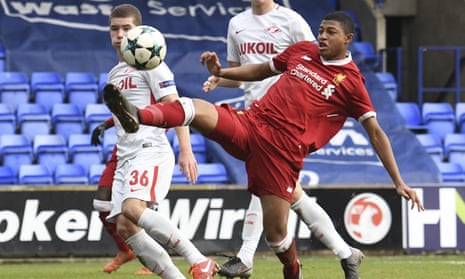It was only last week inside Moscow’s State Kremlin Palace that the Russian president, Vladimir Putin, declared the country ready to welcome the football family with open arms at the World Cup finals next summer.
Those words must have rung particularly hollow in the ears of Liverpool’s young players on Wednesday evening when, for a second time this year, one of their number was allegedly racially abused during a Uefa youth fixture against Spartak Moscow.
Rhian Brewster has repeatedly shown he is a young man with a wise head on his shoulders: one of England’s brightest talents, a key part of the recent Under-17 World Cup-winning team and a player who has gained plaudits from Jürgen Klopp.
Brewster was so disgusted by an alleged racial epithet aimed at him by Spartak’s 19-year-old captain, Leonid Mironov, that he briefly lost his composure and coaching staff, including Steven Gerrard, had to talk him down. Watching all this unfold was the Nigerian-born Bobby Adekanye, who is 18 and was subjected to monkey chants from Spartak supporters while playing in the reverse fixture in September.
Uefa’s punishment of that incident was pitiful as the European governing body ordered Spartak to leave 500 seats empty in their academy stadium for the next Youth league fixture and display a banner bearing the “EqualGame” promise. A nice thought but unlikely to deter small-minded idiots from similar abuse in the future.
For the sake of Brewster, Adekanye and the other black and ethnic minority players growing increasingly wary of travelling to Russia, Uefa must mete out harsher punishment after this latest alleged breach of the rules.
Incidents occurring on the pitch are harder to prove than those in the stands with video footage less conclusive but, by the letter of the law, Mironov will be banned for at least 10 games if found guilty.
This is a sufficiently severe personal penalty but the incident must be seen as a continuation of the same issue which led to Adekanye being abused. Spartak should therefore be hit with a full stadium closure order for their next Youth game and with points deductions.
However, the Football Against Racism in Europe group would like Uefa to consider other courses of action. “We want to see them oblige Spartak’s youth players to enrol in an anti-discrimination course,” said Pavel Klymenko, the organisation’s eastern European development officer.
“We’re talking about 16, 17, 18‑year‑olds who didn’t have full school education and their knowledge of diversity is even more limited and we’re seeing that on the pitch. It’s an alternative sanction.”
There is a precedent for this course of action. When president of the Italian Football Federation, Carlo Tavecchio was banned from football‑related activity for six months after making a comment about a fictitious African player he named Opti Poba “eating bananas” during his election campaign. He was also ordered to go on a course and organise an anti-discrimination event.
Efforts have been made in Russia to address racism in football, even if some people view them as purely superficial. The former Chelsea midfielder Alexei Smertin was appointed as an anti-racism and discrimination inspector but has demonstrated an inability to grasp the scale of the problem blighting Russian football, naively promising there would be no issues of racism at the World Cup finals next year.
When there were a total of 89 reported incidents of racism in Russian football in the 2016‑17 season, it seems more of a hopeful than a realistic assessment of the situation.

